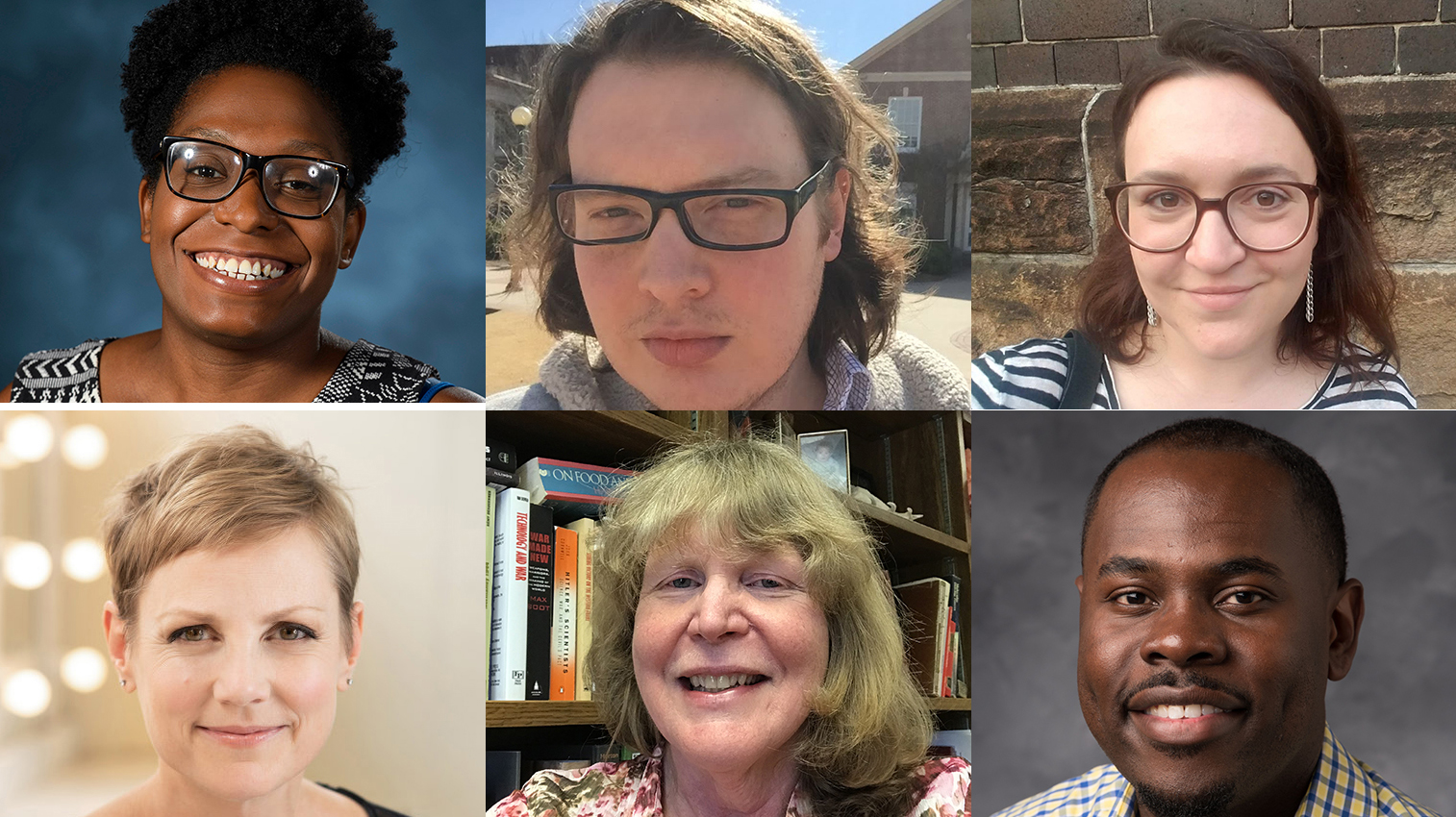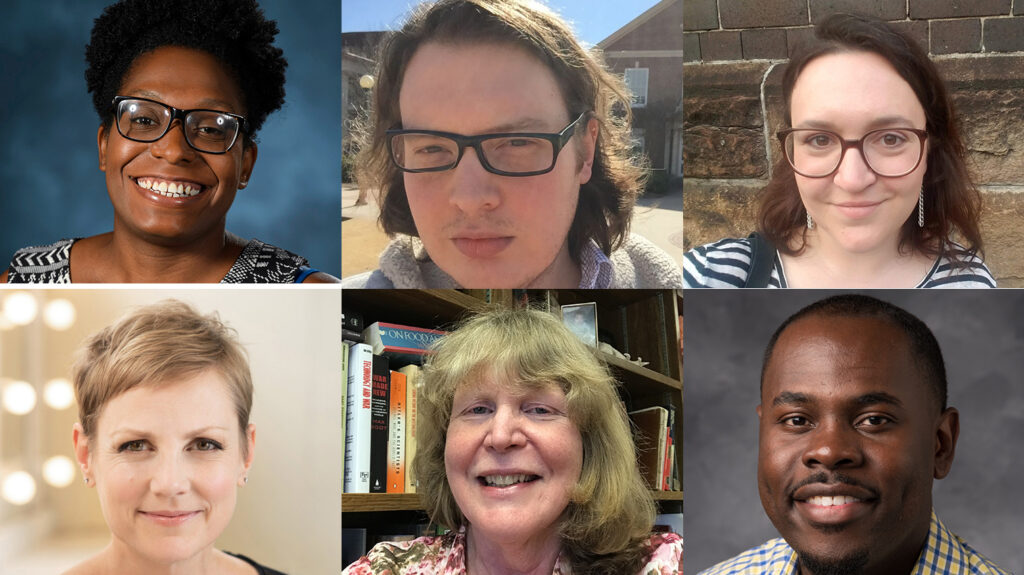Featured
UM Isom Center Names 2022-23 Fellows

By Benita Whitehorn
University of Mississippi

The Sarah Isom Center for Women and Gender Studies has awarded fellowships to six University of Mississippi faculty members for their academic research related to gender and sexuality.
Susan Pedigo, Lauren Bone Noble, Ari Friedlander, LaToya Faulk, Alexandra Lindgren-Gibson and D’Andre Walker are this year’s Isom fellows.
“The fellows this year had such interesting and diverse research projects,” said Jaime Harker, director of the Isom Center and professor of English. “All the applicants were so strong that we requested the provost support all the projects submitted this year, and he graciously agreed.”
During the two-year program, fellows receive $4,500 a year in support of the research project they submitted in their fellowship application. The funds may be used as summer salary, for travel and/or for graduate student support. Fellows may also coordinate with the Isom Center to plan lectures, campus events and develop new cross-listed courses.
“We feature their work in a poster session every fall,” Harker said. “I am always inspired by the work of Isom fellows, and our fall reception is one of my favorite events every year.”
The poster session will take place this year at 3 p.m. Sept. 21 in the Ford Ballroom at The Inn at Ole Miss.
Pedigo, professor of chemistry and biochemistry, said she will use her fellowship to examine the attitudes of women and Black faculty in chemistry departments in Mississippi universities about the issue of merit and reward. She will use the funds to recruit and pay student workers for the development of qualitative assessments, interviews and interview analysis addressing this subject.
The gender gap in STEM faculty is well documented; however, the cause of the gender gap is not well understood, Pedigo said. She believes a problem exists with the rigidity and nature of the structure around the merit and reward system in academics.
“There is heavy demand on faculty to be competitive individualists who enter into a binding work contract upon hire; thus, faculty members are tracked into a path from which they cannot deviate,” she said. “I hope that my research prompts conversation and reflection around topics that are generally not discussed. Tenure and promotion guidelines are steeped in tradition and do not allow for alternative pathways to excellence and institutional transformation.
“Faculty is tasked with training students to tackle the problems of the 21st century, and only a diverse workforce trained by a diverse professoriate can accomplish this task.”
Bone Noble, assistant professor of movement for the actor, is working on a new play titled “Madame Zarechnaya.” The story revolves around the character of Nina Zarechnaya from Anton Chekhov’s play “The Seagull.”
This is Bone Noble’s third in a series of plays focusing on female stories and protagonists.
She said she hopes to have the first draft of a full-length, four-act play by the end of the first summer and use the second summer for revisions.
“In my work, I endeavor to tell the stories of women, not through their relationships to others – the mom, the wife, the girlfriend, the secretary – but in relationship to themselves, the world around them and most importantly, their dream of themselves,” Bone Noble said.
“I am interested in telling stories about the female-identified journey that are as complicated, messy, glorious, tragic and inspiring as those in the vast catalog of the male-identified hero’s journey.”
Walker, assistant professor of criminal justice and legal studies, will conduct a study exploring the relationship between teenage pregnancy loss and inadequate coping. He plans to use the fellowship for data access, and to disseminate research findings at regional and national criminal justice conferences.
“It is my goal to increase awareness of the psychological and behavioral effects of pregnancy loss among adolescent girls,” Walker said.
“Gender and crime remain a focus of (the) criminologist. More specifically, scholars have become interested in understanding female criminality.
“The current study will add to our knowledge on gender and crime by investigating whether pregnancy loss increases adolescent girls’ susceptibility to criminal and deviant behavior.”
Friedlander, assistant professor of English, plans to work on his book project, “Inventing Impotence: Sex, Labor, and Disability in Early Modern England,” which explores the evolution of the concept of impotence in Renaissance England.
Mostly thought of today as relating to sexual disability, impotence encompassed a broader meaning in Renaissance England, touching on politics, social status and economics, Friedlander said.
“My goal in this research is to understand what role the sociopolitical aspects of this concept played in defining the sexual ones, and vice versa,” he said. “I believe that tracking this relationship in early modernity will produce insights into how social class and disability are tied to concepts of sexuality and gender in society today.
“I hope to help change how we think of the history of disability by showing that it is not a marginal social phenomenon, but a central part of the evolution of modern political consciousness.”
Faulk, lecturer in composition and rhetoric, plans to use her fellowship to facilitate writing workshops for community residents to foster creative expression and a sense of belonging.
“Feeling a sense of belonging, in a place like Oxford, Mississippi, can be a struggle for BIPOC women and those who identify as LGBTQ+,” Faulk said. “Safe writing spaces, where a shared ethics of care is esteemed and creative written and visual expression is welcomed, could help support those who feel isolated and marginalized.”
She said she also would like to contribute research on public creative learning spaces that can encourage discussions about displacement and what it means to experience a sense of belonging, particularly in the South.
A pilot eight-week writing workshop will take place this September and October. After a survey assessment to gain an understanding of participants’ needs, a second writing workshop is scheduled for June-July 2023.
The workshops are free of charge, and drinks and refreshments will be provided. Though space is limited, anyone who is interested in being part of the writing workshops can contact Faulk at llfaulk@olemiss.edu.
Lindgren-Gibson, assistant professor of history, said she’ll be exploring the history of friendship in the British Empire in the 19th and early 20th centuries and is planning a research trip to archives in the United Kingdom this summer.
She hopes to find a few letter collections that can form the basis of an article and eventually a book proposal.
“My research is driven by two big questions: How did people live their lives in the past, and how have the stories of those lives been obscured for us in the present?” she said.
Lindgren-Gibson said she became interested in this research when she found a collection of papers in the British Library from an Afghan woman, Mermanjan, who married a British officer in the 1840s.
“The collection was totally fascinating – you could see her learning how to write in English, she made sketches of the new community she was a part of – so there are lots of images of women in massive petticoats and men in top hats; she and her husband would sketch together, and she kept scrapbooks.
“But I was also interested in how these papers came to the archive in the first place. They weren’t donated by Mermanjan’s family – which is the usual route – but they were donated by one of her friends to whom Mermanjan had left the papers when she died. And this friend made Mermanjan’s story part of her own family history – even though they weren’t related.
“I started to think about how friendship can shape histories and the way we remember and preserve the past. Friendships are powerful parts of almost everyone’s life, but our archives aren’t set up to preserve the histories of those ties.”









































